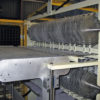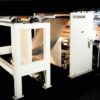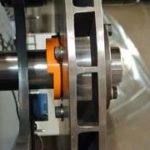Additional equipment coupled with an increased sales effort has allowed a North Carolina paper converter and distributor to expand its converting customer base while obtaining a greater market share in the lithographic industry.
In turn, the new equipment improved production methods and speeds and allowed the firm to produce the quality products demanded by its industrial customers in the lithographic field. The new equipment also gave the firm faster turnaround, which is a key requirement for successfully handling specialty orders.
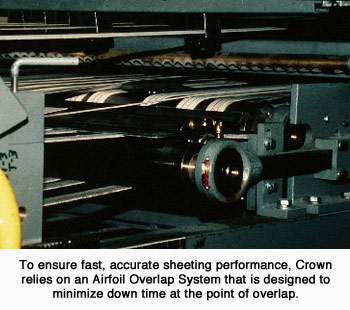 Crown Packaging & Converting, Wilmington, NC, has been converting industrial grade paper for seven years. The firm saw a need to obtain more converting customers and wanted to increase its lithographic market share by offering high-quality, custom-converted, print-grade papers.
Crown Packaging & Converting, Wilmington, NC, has been converting industrial grade paper for seven years. The firm saw a need to obtain more converting customers and wanted to increase its lithographic market share by offering high-quality, custom-converted, print-grade papers.
“In terms of speed and the ability to produce top-quality products, our existing equipment wasn’t suited for producing print grade paper,” Rusty Carter, president, said. “And, with a limited sales force, we couldn’t adequately saturate this market.”
Carter made an all-out effort to increase the company’s converting capabilities and become more competitive in the Southeast. To reach these goals, the firm took the following steps during a four-month period:
Nearly double its sales force.
Purchased a MSH precision sheeter from Maxson Automatic Machine Co., Westerly, RI.
Installed a die cutter from Consolidated International, Chicago, IL.
Added an automatic paper handling system to its Polar guillotine trimmers.
Expanded the inventory area by 15,000 sq. ft. to handle the additional output of converted products.
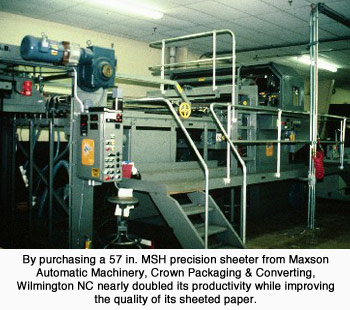 Currently, Crown offers a full range of custom converting processes, including sheeting, slitting, die cutting, rewinding and guillotine trimming. The firm converts poly-coated board, clay-coated kraft and newsprint for the industrial market and offers SBS board, uncoated offset paper and premium-grade coated paper to large commercial printers.
Currently, Crown offers a full range of custom converting processes, including sheeting, slitting, die cutting, rewinding and guillotine trimming. The firm converts poly-coated board, clay-coated kraft and newsprint for the industrial market and offers SBS board, uncoated offset paper and premium-grade coated paper to large commercial printers.
Carter said the purchase of the 57-in. sheeter was central to Crown’s success in the print-grade industry where the highest quality converted products are demanded. Maxson’s ability to produce clean, square sheets at high speeds was the primary consideration in selecting the sheeter, according to Carter.
With the new sheeter, the firm can sheet at speeds up to 1,000 fpm and deliver press-ready skids to customers quicker. The unit’s speed is almost double that of the firm’s two older sheeters. To support the increased sheeting volume, a die cutter and third trimmer were purchased shortly after the sheeter was installed.
“As a custom converter, it’s critical that we respond quickly to specialty orders,” Geoff Searcy, vice president/converted products, said “With so much competition in the Southeast, service and product quality are essential. The Maxson’s capability as a quick setup, quick turnaround, high-speed sheeter puts us in a position to gain and keep customer.”
In Crown’s prep area skids are counted and wrapped in protective packaging. Finished skids of paper are strapped and banded before shipment or storage to fully protect and maintain product quality.
Crown relies on an advanced, air delivery system to provide high sheeting efficiency. The Airfoil Overlap system is designed to provide more reliable performance at the point of overlap and faster sheet feeding from the cutting section to the stacker.
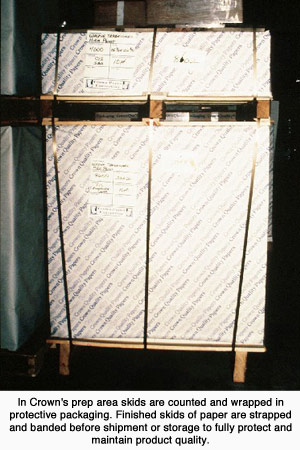 Customized to sheet accurately from a 20- to 70-in cutoff length at tolerances of +/- .023 in., the sheeter’s equipment includes: a slitter; a self-loading; shaftless back stand; and a stacker. Crown converts caliper grades from 6 to 36 points.
Customized to sheet accurately from a 20- to 70-in cutoff length at tolerances of +/- .023 in., the sheeter’s equipment includes: a slitter; a self-loading; shaftless back stand; and a stacker. Crown converts caliper grades from 6 to 36 points.
“Whether the sheeted product is being sent to die cutter or directly to the prep area, we depend on the sheeter to meet the precise requirements set by our customers,” Searcy said.
A PEN MAM dust collector was installed on the sheeter to ensure a clean product. Its function is to suction the dust generated by the cutting and slitter of the sheet at the delivery tape section.
“Because a large percentage of the material run on the sheeter is coated bleach board , there can be dust,” Charles Norton, general operation manager, said. “We wanted to guarantee a clean cut. The dust collecting system allows us to ship board off the sheeter and out the door dust-free.”
Crown also depends on air-washed doctor boards to protect the sheet. The boards eliminate friction points that can use cause edge damage, according to Norton. Attached after the knife, the air suction pulls the leading edge of the sheet to direct it more efficiently into the mouth of the tape system.
The Maxson stacker is equipped with extending grids that allow continuous off loading for optimum productivity.
Although there were numerous changes in its converting operation, Crown found the transition and day-to-day operation smooth and easy. Maxson engineers trained Crown personnel on operating procedures. The sheeter requires only one operator, who is also responsible for the quality control of the incoming webs and stacked skids.
In the prep area, skids are counted and wrapped in protective packaging. They’re also strapped or banded for shipment or storage. Wood tops are placed on the skids to ensure product protection.
“The project has been a major success,” Carter said “Converting sales have kept pace with the increased out-put capabilities. In less than a year’s time, we’ve built our print-grade paper operation from about 10% to about 50% of our converting business. In other words, we doubled overall sales. Now, we’re probably a step or two ahead of the competition because of the variety and quality of products we convert.”
Reprinted from Paper Film Foil Converter, January 1988


